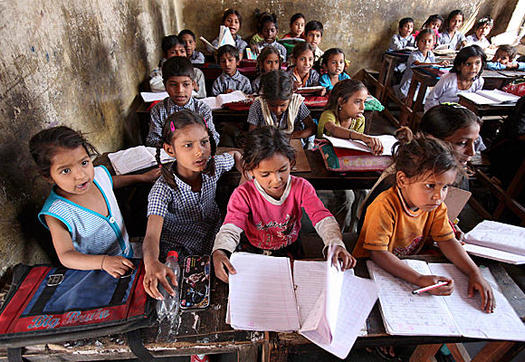In this article, Gazal Preet Kaur of Rajiv Gandhi National University of Law, Punjab discusses how to help underprivileged students attend the school.

Education is the most important feature of any budding nation. The nation builders were not averse to this very idea. Post-independence the only set of people who constituted the elite groups were those who had attained higher education and understood the perspective of rationality. Since then a good part of public expenditure is concentrated in the education sector.
- Every year, the GDP as the government commitment to education, rises at approximately, 0.03% every year.
- According to a report submitted by the Ministry of Human Resource and Development, the enrolment of students in the Primary and Secondary Education has increased drastically in comparison to the previous years.
- But it must be noted that the drop-out rates are similarly very high. 4.36% of boys and 3.88% of girls drop out of their primary schools. There are varied reasons, one of them being the arbitrary concept of bread winners.
- Therefore, it becomes necessary for every educated citizen to promote the cause. Various individuals and NGOs like the below have taken it on themselves to work in the very field. (Here is the list of NGOs, helping underprivileged children attend school).
| NGO | Offices | Contact Number | Email Address |
| Smile Foundation | Delhi, Mumbai, Bangalore, Jaipur, Chandigarh, Chennai, Kolkata, Hyderabad | John – 9820363999 (West), Sapna – 9844134243, (South) | [email protected], [email protected] (Mumbai), [email protected] (Bangalore), [email protected] (Delhi) |
| Vidya | Delhi, Gurgaon, Mumbai, Pune, Bangalore | 01244049559 | Email: [email protected] |
| Teach for India | Mumbai, Delhi, Pune, Hyderabad, Chennai | +91 22 25194283 | – |
| Make a Difference | Mangalore, Chennai, Bangalore, Mysore, Delhi, Dehradun, Kolkata, Vellore | – | [email protected] |
| Cry | Delhi, Mumbai, Bangalore, Chennai, Kolkata | – | [email protected], [email protected], [email protected], [email protected], [email protected] |
| Barefoot College India | Ajmer | +91 (0)1463 288210, +91 (0)1463 288351 |
[email protected] |
| Shubhashikha | Delhi | 9810201542 01125253645, |
[email protected] |
| Truegiv | Delhi | +91-956 049 7222 | [email protected] |
| Pratham | Delhi, Mumbai | (91) (11) 26716083 / 41651638 | [email protected] |
| Atma | Mumbai, Pune | +912224181240 | [email protected] |
| Fandry Foundation | Mumbai | + 91 9029714387 | [email protected] |
| Agatsya Foundation | Bangalore | (+91 80) 41124132, (+91 80) 23545054 | [email protected] |
| Thirupuvanam Foundation | Chennai, Bangalore | + 91 80 2547 3284 | [email protected] |
| BREADS | Bangalore | +91-80-25463476; 25805551 | [email protected] |
| Udaan India Foundation | Mumbai | 0091(022) 40000392, +91 9967885468 | [email protected] |
Constitutional Guarantee of Free and Compulsory Education
The Indian Constitution has been elementary in paving the way for The Right of Children to Free and Compulsory Education Act, 2003. Article 21A provides free and compulsory education to the children falling in the age group of 6-14. Article 45 of Directive Principles of State Policy tells the same. It must not be forgotten that the ideals that society must run on has education as the very basis. The identification of the children wo can avail the benefit must be done. That will help in the admission of the child to a government or government aided school.
Who can avail free and compulsory education?
Any child falling in the age group of 6-14 and is a part of-
- Scheduled Caste
- Scheduled Tribe
- Socially and Educationally backward class
- Or any class that has been disadvantaged due to their social, cultural, economic, geographical, linguistic or any other factor as appropriated by the government.
- Weaker Section that means the annual income the parent or guardian is below the limit that is set by the State or Central government.
It is to be noted that the foreigners can also avail the benefit of Right to Education under Article 21A of the Indian Constitution (except the alien enemies). Also, any specially abled child has to be educated in pre-schools or schools by the appropriate government under Section 25(2)(g) of the Rights of Persons with Disability Act, 2016.
Where can a child be admitted for Schooling?
According to Section 3(1) of Right of Children to Free and Compulsory Education Act, 2009, any child fit to avail the free elementary education can be admitted to any neighbourhood government school. He/she can avail the benefit till the completion of the elementary education, even after the age of 14. Any child is not liable to pay any amount of fees that might compel him/her to stop pursuing the benefit. A child can also be admitted to any private school that is being financed or administered by the concerned government by his/her parent or guardian. To such students, admissions up to 25% percent is allowed. There is a disadvantage to admission in such schools since the child or the parent/guardian cannot sue the school for any expenditure incurred during the elementary education, the reimbursement cannot be enforced. After the admission, no child can be forced to not appear in the examination or to avail the attendance or any kind of atrocities. At the end of the education, the student has to be awarded a certificate. The government makes sure to keep a check on the aided institutions by helping them with finances, infrastructure and administration. Schemes like Infrastructure Development in Minority institutions has also proven to be beneficial to the minority institutions that do not entrust their certain working on the government.
The government schools in specific, offer all the necessities required for nurturing a child overall. The Mid day meal scheme has proven to be effective to bring the children from their homes to school. The children from poor households avail the benefit of nutrition rich food along with the process of learning. Along with this scheme, the government aims to introduced various schemes to benefit the students studying in government or government aided schools. Schemes of Sarva Shiksha Abhiyan (SSA), Rashtriya Madhyamik Shiksha Abhiyan (RMSA) and Teacher Education (TE) that fall under the ambit of the newly proposed Samagra Shiksha aim at treating school education as a whole. That means there will be no segmentation from pre-nursery to 12th standard.
What are the admission formalities?
The admission has to be done by the parent or the guardian of the child. Any document that identifies the age of the child is good enough to get the child admitted. No capitation fee or any kind of direct fees has to be given to the school. In the absence of any legal proof for the age of the child, the admission cannot be denied by the school authority. So, if we talk in the very gist, we just need to convince the child and his/her parent or guardian to get the admission done. There’s hardly anything that is required to do the same other than will.
In case the child is a migrant and keeps migrating along with his parent/guardian, he can gain a transfer certificate from the previous school. This will allow him to continue his studies irrespective of the place of residence.
Government aid in higher education
If the child has already completed the elementary education and wants to pursue higher education, there are primarily two ways in which the government helps to do the same. These are scholarships and loans. For the purpose of an education loan, the student has to be meritorious and eligible according to the criteria laid by the concerned government. Any child who has been excellent during the school has the benefit of scholarships. They provide as a boon for those who have the real urge of learning. These scholarships are merit-based, need-based, student-specific, career-specific and college-specific. The National Scholarships that are provided by the government are-
- Central Sector Scheme of Scholarship for College and University Students
- Special Scholarship Scheme for Jammu & Kashmir
- Scheme for Scholarship to Students from Non-Hindi Speaking States for Post Matric Studies in Hindi
Scholarship Schemes One Shuold Know About
- Thomson Reuters Scholarship for LL.B. students
Apply- https://www.vidyasaarathi.co.in/Vidyasaarathi/scholarship
- Schindler India Scholarship for Diploma students
Apply-https://www.vidyasaarathi.co.in/Vidyasaarathi/scholarship
- JSW’s Udaan Scholarship for B.Ed. students
Apply-https://www.vidyasaarathi.co.in/Vidyasaarathi/scholarship
- ACC Vidyasarthi Scholarship for B.E./B.Tech. students
Apply- https://www.vidyasaarathi.co.in/Vidyasaarathi/scholarship
- Thomason Reuters Scholarship for B.Com. students
Apply- https://www.vidyasaarathi.co.in/Vidyasaarathi/scholarship
- C. Mahindra Scholarship for Diploma Students
Apply- https://kcmet.org/what-we-do-Scholarship-Grants.aspx
- Commonwealth Shared Scholarship to study in foreign Universities
Apply- http://cscuk.dfid.gov.uk/apply/
- Tata Steel Twin Scholarship for Engineering, Polytechnic, Medical, MCA, Microbiology, and Biotechnology students
Apply- http://www.tatasteel.com/
- Special Assistance Programme by UGC for Research based studies
Apply-https://www.ugc.ac.in/sap/
- Cultural Talent Search Scholarship Scheme for children in artistic fields
Apply- https://drive.google.com/file/d/1tZQ70HY-IJ7yOPfysd1OmiER_QKgYbau/view
NGOs and charitable institutions providing private tuitions to the underprivileged children
In case the parent/guardian does not want to send their children to school and you can no more convince them, teach them! What is the point of education when you cannot help the fellow members of the society to rise against all the odds? You can at least teach the children to learn basic nuances of a language. Knowing how to read and write is one of the biggest privileges that anyone can receive. When the child fails to go to the school, you bring the school to him.
Various NGOs and charitable schools are providing free primary education to the children. If the government school fails to give benefits that the parents expect them to, the children can be brought into contact with the foundations who know exactly what the child needs. Some of the prominent schools serving the cause are mentioned below-
Schools in Delhi
| Katha Lab Govindpuri | (011)26868193, 26521752, 26524350 | [email protected] |
| Vidya School | 01244049559 | [email protected] |
| Pratham | (91) (11) 26716083 / 41651638 | [email protected] |
| Smile Foundation | 9216094777 | [email protected] |
| Cry | – | [email protected] |
Schools in Mumbai
| Vidya School | 02225787317 | [email protected] |
| Pratham | (91) (22) 22819561 | [email protected] |
| Smile Foundation | 7875592560 | [email protected] |
| Akanksha School | +912223700253, +912223729880 | [email protected] |
| Door Step School | 022 2382 6343 | [email protected]. |
| Cry | 23096845/6472 | [email protected] |
| Paryay | – | [email protected], [email protected]
|
Schools in Bangalore
| Vidya School | 9986422009 | [email protected] |
| Cry | 25484952 | [email protected] |
| Akshra Foundation | 080-25429726 | [email protected] |
| Smile Foundation | 9845205785 | [email protected] |
| Jindal Public School | 080 2371 4539 | [email protected] |
 Serato DJ Crack 2025Serato DJ PRO Crack
Serato DJ Crack 2025Serato DJ PRO Crack









 Allow notifications
Allow notifications



I am confused. Under the title of the article it says: By Anubhav Pandey – February 28, 2019;
After that I read: In this article, Gazal Preet Kaur of Rajiv Gandhi National University of Law, Punjab discusses how to help underprivileged students attend the school.
Now who is the author?